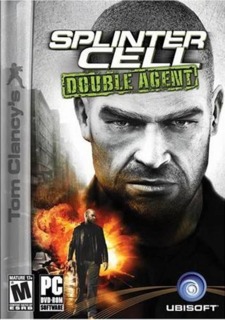Double Agent manages to be the most memorable game in the series despite its flaws and lack of new features.
Cons: …Except that there is almost no one left online; Daytime missions stray from the series' strengths; Essentially the same game you've played three times already; Story presentation is still a little botched and confusing
How far would you go to maintain your cover? This is the question that Sam Fisher's fourth foray into the stealth genre poses. Fisher's story takes a dark turn as his daughter is killed by a drunk driver and he hits rock bottom within the first hour of the game. However, this ultimately seems to have no real impact on the rest of the story as Sam just proceeds to take an undercover mission infiltrating the terrorist organization John Brown's Army. The missions here feel more like isolated incidents than a part of a bigger picture, but that doesn't stop them from being entertaining nonetheless.
If you've played any of the past Splinter Cell games (particularly Chaos Theory), you know what to expect here. As Sam Fisher, you work for a top secret organization and must stick the shadows and walk softly in order to infiltrate and spy on your enemies. Ubisoft has made minor changes to eliminate HUD by removing the shadow and sound meters as well as putting in a regenerating health system, but none of these features truly change the same gameplay that you've likely played three times prior.
What provides more change is the level structure. Double Agent has attempted to instill a little more variety in its locations and often sends you to memorable locations such as cruise ships and later battlefields. Furthermore, strong scripted events help make Double Agent's levels stand out from the rest of the series. Unfortunately, Ubisoft has also chosen to set many of these levels in the day time and this undermines the stealth aspect of the game, which relies heavily on shadows.
On the other hand, the base missions, which have you infiltrating the JBA's headquarters and attempting to gain intelligence on the organization within a set time, are much better executed. Usually set in the dark, these missions don't let you use any of your tools or kill the enemies. Coupled with a constant time limit and multiple optional objectives, these prove to ironically be one of the highlights of the game, despite being some of the most anticlimactic moments.
But of course, if the JBA notices you sneaking, they aren't necessarily going to trust you. Herein lies the oversimplified trust system in which completing objectives for each team helps fill a meter, while failing to complete objectives drops the meter. For the most part, these meters are really easy to keep at a max, so the function doesn't fundamentally change the game. However, there are times when you will have conflicting objectives for each team and must make some tough decisions. These scenes are particularly well done and you are always left wondering if you made the right choice. It's just a shame that they don't arrive more often.
The single player campaign lasts roughly 10ish hours and since the game records your performance you have plenty of reason to go back. If you're willing to play against bots (since there's only a handful of people left online), the multiplayer will also boost the life of the game.
The basic premise of this mode is that one team, the spies (who play like sped up, less lethal Sam Fishers) must download and escape with data from the mercs (who play like a standard FPS) before time runs out or they get killed too many times. Thanks to some dynamic level design, the spies are always able to use their abilities to maneuver to the bases undetected and the mercs have enough offensive power that they can still easily win if the spies aren't careful. It's a truly unique and fun (albeit challenging) mode and it's a shame that there aren't too many people online.
Presentation for the game is pretty standard fare, particularly being an early 360 game, and the sound is likewise traditional. Without any dramatic new twists and with some notable flaws, Double Agent is a tough sell for people who aren't fans of the series already. However, for those who want a memorable stealth experience for their next-gen systems Splinter Cell Double Agent fits the bill.

